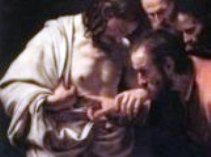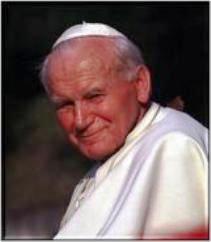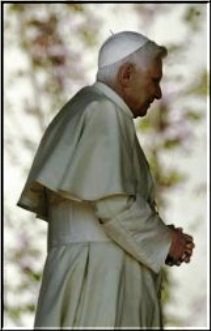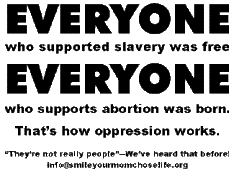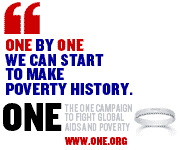 At the Council of Chalcedon in A.D. 451, it was universally confessed throughout all of Christendom that Jesus Christ was the incarnate Logos of God. The Fathers of the Church explicitly wrote:
At the Council of Chalcedon in A.D. 451, it was universally confessed throughout all of Christendom that Jesus Christ was the incarnate Logos of God. The Fathers of the Church explicitly wrote:
"Following the holy Fathers, we unanimously teach and confess one and the same Son, our Lord Jesus Christ: the same perfect in divinity and perfect in humanity, the same truly God and truly man, composed of rational soul and body; consubstantial with the Father as to his divinity and consubstantial with us as to his humanity; 'like us in all things but sin.' He was begotten from the Father before all ages as to his divinity and in these last days, for us and for our salvation, was born as to his humanity of the virgin Mary, the Mother of God. We confess that one and the same Christ, Lord, and only-begotten Son, is to be acknowledged in two natures without confusion, change, division, or separation. The distinction between natures was never abolished by their union, but rather the character proper to each of the two natures was preserved as they came together in one person (prosopon) and one hypostasis."
In modern times, the rise of skepticism and historical criticisms has led to the question of whether Jesus of Nazareth the historical person is identical with Jesus Christ, the Son of God. There is no doubt that the person of Jesus is a mystery to us all. But what can we know about him? Can we know him? The Christian faith invites us to know God through the Messiah who died on the Cross for our salvation. Therefore, in order to accept this invitation, Christians must attempt to encounter an engimatic figure who walked the earth 2,000 years ago...a figure shrouded in mystery and controversy.
Biblical scholar, Howard Clark Kee in his scholarly work What Can We Know About Jesus? posits that much can be known about the historical Jesus of Nazareth. We can know, for example, that Jesus the Christ, as he was known by his followers, died by Roman crucifixion. Kee backs this claiming that it “is confirmed by all evidence available—Jewish, Roman, and Christian.” Kee in his biblical scholarship employs the historical-critical method of analyzing Christian scriptures. According to this approach, in order to understand who Jesus of Nazareth was, one must read the four canonical gospels within their social and historical context.
Pope Benedict XVI in Jesus of Nazareth takes a profoundly different approach to the historical Jesus. The Pope acknowledges that the differences in all the gospels as a “struggle to come to grips with the figure of Jesus,” but recognizes—something Kee would agree with—that there is still “a deep harmony despite their differences.” The Roman Pontiff and Kee diverge ultimately on the fundamental basis that the Holy Father firmly holds that the study of the figure of Christ—a true Christology—cannot be removed from theological tradition that is associated with his person. Though, Benedict XVI and Kee would agree that the four canonical gospels are a source of credible information about Jesus of Nazareth, their competing approaches lead to profoundly different conclusions on who Jesus of Nazareth really was.
Kee approaches the mystery of the historical Jesus using a rigorous scholarly method. He proposes that one must first uncover “source Q”—a hypothetical document containing the earliest tradition of information about Jesus and his teaching—in order to fully know Jesus. Since the Q document is not readily available to us, the surest way to uncover the historical Jesus is to look to the four canonical gospels. For Kee, the letters of Paul—the earliest Christian writings—are not as valuable as the writings of the four Evangelists because Paul’s letters are “plagued” by religious teaching and “suprahistorical” facts about Jesus, e.g. his resurrection from the dead, his Real Presence in the Eucharist, etc. Kee has the same view on other non-canonical works. Despite their value in cross-referencing facts and validating or disproving a hypothesis, these sources offer no substantive information about Jesus. Kee thus concludes that in the “search for knowledge about Jesus, we are led, therefore, to the primary sources: the Gospels of our New Testament.” The four gospels offer a coherent view of the man Jesus, if read without giving attention to the “theological opinions” attached to Jesus. Kee articulates in his book that the person of Jesus is covered, as it were, with doctrine and ideas that were possibly conceivably of after his death. For example, Kee notes that in the Gospel of Mark, the birth narrative of Jesus is ignored. In fact, the Markan tradition doesn’t focus on Christ’s fulfilling messianic prophecies—there is no virgin birth or savior that comes to us from Bethlehem. This reality is not ignored in Luke and Matthew.
The seeming discrepancies in the gospel are realities that Kee is conscious of in his attempt to solve the puzzle that is the person of Jesus. It is Kee’s understanding that all the evangelists present their own theological convictions for a specific audience with specific circumstances leading to the writing of Jesus' gospel message and this will influence how they present Jesus. Kee fears this leads to distortion and disables us from truly, objectively, knowing Jesus. In putting the pieces of the puzzle together, Kee insists that Luke “reproduces more primitive forms of the sayings of Jesus” whereas other gospels like Matthew’s account of the “good news” written primarily to Jews is “adapted…freely to his purposes.” This emphatic pronouncement demonstrates Kee’s commitment to an almost empirical scholarly method. He is interested in where Jesus was born, the surrounding historical events that may have shaped his life, what he said and how his religious beliefs might have influenced him, and so forth. Luke provides information about his birth, a reference to his childhood experience in the Jewish Temple, and a very synoptic view of Jesus’ life that is chronological and historically-based. Kee ultimately does not view Luke as primarily as a historian, noting that Luke tries to show “the continuities and transforming differences between what was announced…in the Old Testament and what happened in the coming of Jesus.”
Kee sums up the entirety of his Christological approach when he writes, “…historians in this period were not interested…in reporting events of the past, but saw their role as providing the meaning of those past events for readers in the present…They did not adopt the pose of objectivity, as though they were merely telling ‘how it really happened’”. Ultimately, Kee reaffirms his earlier thesis that in order to know the person of Jesus of Nazareth one must approach the scriptures with a critical eye that filters out the theological add-ons and search for solid facts based on the historical and cultural context of the life of Jesus and the written accounts of his life.
Pope Benedict XVI in Jesus of Nazareth announces within a few lines that there is a growing chasm between the historical Jesus and the Christ of faith. This is a pressing problem to Christians especially. If the Jesus of the Christian faith is not the same person as the historical person they believe to be God incarnate—the eternal Logos united with human consciousness and flesh—then their faith is in vain. The Pope poses the inevitable question: what would it mean “if the man [Benedict’s emphasis] Jesus was so completely different from the picture that the Evangelists painted of him and that the Church, on the evidence of the Gospels, takes as the basis of her preaching?” The Holy Father then proceeds to answer the question, first, with a closer examination of the historical-critical method. He does not discredit the approach, saying, “the historical-critical method…is an indispensable tool, given the structure of the Christian faith.” However, the Pope cautions Christians on the weakness of relying solely on such a method, saying it “considers the individual books of Scripture…and then analyzes them…according to their sources. The unity of all of these writing as one ‘Bible’…is nothing it can recognize as an immediate historical datum.”
Benedict XVI takes the position—in opposition to Howard Kee—that to know the person of Jesus is impossible by divorcing him from the Christian faith. The historical-method only shows a single dimension that perhaps can be seen as a new “movement” in Judaism that eventually splintered into a new religious tradition based on the beliefs of the followers of a man called Jesus—whether or not these beliefs are actually the teachings of Christ is not known, or just irrelevant. The Pope seems to identify this stance as the modern stance and why the world has come to see a gap between the historical Jesus and the Jesus of faith. Benedict XVI posits that the authentic way to know the historical Jesus—and thus, the Christ of faith—is by what he refers to as “canonical exegesis.” The reading of the scriptures as a whole, he writes, “is an essential dimension” to understanding what the writers of the gospels are trying to convey about Jesus Christ and thus it illuminates more clearly who Jesus of Nazareth is. This approach “does not contradict historical-critical interpretation” but rather leads it to fruition.
Jesus of Nazareth, in the Pope’s view, cannot simply be a moral teacher or a Jewish revolutionary. Rather, he was a man and “he truly was [Benedict’s emphasis] God, and…he communicated his divinity in parables, yet with increasing clarity.” Most importantly, the Pope goes further declaring that such a reality “exceeds the scope of the historical method.” Thus, Benedict XVI contradicts Kee’s assertion that the way to know Jesus is to look at the theological traditions of the gospel writers without taking such religious convictions seriously. Benedict XVI argues the contrary. According to this line of thinking, one cannot know the historical Jesus without adhering to the teachings of the Gospel. To have faith in Christ, to know the Jesus of faith is how we know the historical Jesus.
Kee in trying to reconstruct the source Q, in Benedict’s view, missed the actual source he was looking for. One such source is the earliest Christian writer, Paul the Apostle. Paul in his letters quotes from early traditions of the Christian church, e.g. a hymn that presents a clearly developed Christology that was developed within approximately ten years of Christ’s death as Paul converted in the 30s A.D. and began writing his letters possibly as early as the 40s A.D. This seems to be in fact superior to a possible “Q” source if such a hypothetical document exists. It readily presents who Jesus’ followers believed him to be with the source of the information being as close to Jesus’ life as history thus far has enabled. Therefore, Kee in dismissing Paul’s letters as too concerned with Christology and theological teachings simply because it goes beyond the scope of history misses the mark. In fact, Benedict XVI points out that modern biblical scholars should see the truth of history—the earliest believers as St. Paul’s letters demonstrates believed that Jesus of Nazareth was God in the flesh and the continuity of this is unbroken by other writings Kee dismissed as too far from Christ’s earthly life. For example, Pope Clement I’s Letter to the Corinthians (96? A.D.) or the seven epistles (including a Letter to the Romans) written by Ignatius of Antioch (d. 110 A.D.), disciple of the St. John the Apostle and Bishop of Smyrna, as he was en route to be martyred in Rome—these letters address topics such as ecclesiology, the sacraments, and the role of bishops clearly indicating the Church, based on the teachings of Jesus, was well-established. Thus, in the search for “objectivity” Kee missed what Pope Benedict XVI introduces to the reader in his book—it is objectively, historical true that the earliest Christians believed the historical person of Jesus of Nazareth to be God and that belief is alive and well in the present today.
In contrast to Kee, Catholic theologian, Hans Urs von Balthasar begins Does Jesus Know Us? Do We Know Him? approving the Evangelists’ gospel approach. Within a few pages, his attention turns to the miraculous works of Jesus particularly in regard to exorcisms. He boldly claims that the nature of demonic possession is not what needs attention, but the fact that Jesus of Nazareth had the power to remove people from such spiritual imprisonment. The underlying question for von Balthasar is—what does this say about this historical person? He goes further to say that Jesus is the God-man, the representation of God to us and mankind to God. Literally, Jesus of Nazareth is the covenant of God and Israel personified. The position is not at all unlike Pope Benedict XVI’s position that Jesus, as God and man, “is a historically plausible and convincing figure.” Benedict XVI in Jesus of Nazareth apologetically asserts that historical Jesus is reconcilable with the Jesus of faith. He takes on the Old Testament prophecies of the coming Messiah—prophecies that he believes Jesus, a person, a historical figure fulfilled. Von Balthasar takes the same position that Jesus, a Jew, was not merely a man that lived in the first century, but he too, was the saving God that created the cosmos.
St. Anselm emphasized that the Christian life is about “fides quarens intellectum”—faith seeking understanding. Von Balthasar picks up rather quickly on the implicit statement behind this assertion: no faith leads to no understanding. Jesus in the Gospels discusses with his apostles who people think he is and St. Peter with faith professes the true answer, “You are the Son of the living Lord.” As if in recollection of this profound scene from Scripture, von Balthasar makes his approach go beyond a purely historical-critical exegesis and allows him to offer a faithful theological presentation of Jesus, true to Christian theology and true to history. Von Balthasar affirms this mission when he writes clearly his vision of the incarnate God in the historical person of Jesus is the result of “the greatest Trinitarian love.” Furthermore, the “terrible possibility and reality—finite freedom rejecting infinite love—cannot simply be wiped away with a harmless act of forgiveness. Anselm was right to say that it demands…the remaking of the covenant between heaven and earth.”
Similar to the approach of Pope Benedict XVI, von Batlthasar makes use of all resources available to him. Analogous to human disciplines—all having to do with the human condition—he doesn’t focus on one, but incorporates all. Psychology without constraint reduces man to a complex mechanism driven by his interpretation of events. Biology reduces man to an animal that ponders; while physics reduces man to the interaction of matter. But, von Balthasar employs theology, history, and the modern interest of psychology to obtain a clear vision of the whole. He rejects the solely historical-critical empirical method of studying Jesus. He quotes from the scriptures frequently to evince the reality that all of the Bible is inspired by God and is a way in itself to know Jesus. He reaffirms this himself, writing, “He is the measure of everything human in all its dimensions. When we read that all knees in heaven, on earth, and under the earth must bow before him (Phil 2:10), this applies to all areas of human life.”
In the section of his book dedicated to the question of whether man can know Jesus, von Balthasar answers firmly with a “yes.” He writes, “Jesus interprets God to man. He does it in his teaching, which links up with what man knows from the Law and the Prophets. Thence it proceeds in two directions, revealing the heart of God and man’s heart and their direct encounter in the New and Eternal Covenant.” Pope Benedict XVI takes an identical position, as he writes:
Unless there had been something extraordinary in what happened, unless the person and the words of Jesus radically surpassed the hopes and expectations of the time, there is no way to explain why he was crucified or why he made such an impact. As early as twenty or so years after Jesus’ death, the great Christ-hymn of the Letter to the Philippians…offers us a fully developed Christology, stating that Jesus was equal to God….and that to him now belongs the worship of all creation, the adoration that God, through the Prophet Isaiah, said was due to him alone.
Both the Holy Father and von Balthasar agree, not with Howard Clark Kee, but on the fact that Jesus is the historical confirmation—an embodied linking—of the Old and New Covenant. Therefore, the historical mystery of the person of Jesus of Nazareth cannot be solved by separating him distinctly from the religious tradition of the Jews or the radical Gospel truth he was said to have taught. Rather, a clear and coherent vision of Jesus of Nazareth can only best be seen in the context of the Christian faith, which, as historical criticism shows, arose from a very complex time period in the history of Judaism and the Roman empire. Jesus then is more than a man or a Jewish rabbi. The truth that the Roman Pontiff, Pope Benedict XVI and the German theologian, both eloquently articulate is this: the Second Person of the Holy Trinity entered mysteriously into the human condition and “dwelt among us” as a person, whom was called Jesus of Nazareth and to us “he brings love and salvation from God.” And this is the truth of the Roman Catholic faith.
 l imprisonment that has plagued the people in their ill-fated sufferings.
l imprisonment that has plagued the people in their ill-fated sufferings.













